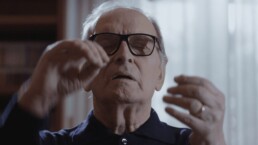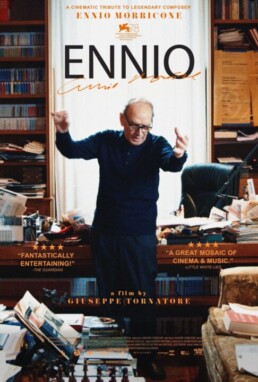‘Ennio’ is a Masterpiece Fit for a Maestro
Fans of his music-making process will revel in the abundance of fascinating interviews with various musicians and directors who have either worked directly with him or were indelibly inspired by him.
It’s been said that, at the sound of the first note, you will be able to identify an Ennio Morricone score. The duality of the music’s boldness and beauty is unmistakable. We also know what will follow is a rich orchestral melody that weaves in and out of emotional landscapes. The prolific composer’s influence on music scores in cinema is explored in great detail through Ennio, directed by his longtime collaborator, Cinema Paradiso filmmaker, Giuseppe Tornatore. Paying tribute to one of the industry’s most legendary artists, Ennio explores the maestro’s career across his iconic film scores, including The Good, The Bad, and the Ugly, Days of Heaven, A Fistful of Dollars, and his Academy Award-winning work on The Hateful Eight, among hundreds more.
I like to listen to music when I write, and sitting down to begin this review was no different. As I opened Spotify and searched for his name, I was shocked but not surprised to see that the Ennio Morricone profile receives an average of 3.3 million listeners a month. His most recognizable song, “The Ecstasy of Gold” from The Good, The Bad, and The Ugly shows that it has been streamed nearly 69 million times and counting. These numbers, while staggering, are only a snapshot of the storied career of the Italian maestro.
The documentary runs just over two hours and thirty minutes, and every frame is packed with words of admiration from Ennio’s peers, including autobiographical anecdotes from Ennio himself. Fans of his music-making process will revel in the abundance of fascinating interviews with various musicians and directors who have either worked directly with him or were indelibly inspired by him. Bringing a personal component to the film, Ennio shares stories about his childhood and reminisces about wanting to be a doctor. It was his father who convinced him to study the trumpet instead. It’s a scenario you don’t hear too often, parents persuading their children’s career path towards the arts over medicine. From there, we weave in and out of his repertoire, growing more awestruck with each passing film score.
The film itself is very traditional in its documentary format, fueled by sit-down interviews that bounce from subject to subject. The stories themselves are larger than the formulaic way in which they are told, which seems like a conscious choice by Giuseppe Tornatore to not let stylistic filmmaking choices get in the way of the heart and soul of the film. It’s clear that this documentary has been in the works for a while; some interviews have a dated, public-access look to them that seems ripe for screening in a museum.
The descriptions given about Ennio Morricone range from “very serious” and “very absorbed” to “a genius” and “a marvel.” Waxing poetic about their idol, some interviewees stated that “the God of music speaks through him as if he were possessed” and “His music is… eternal.” Before his passing in 2020, Ennio finally won his long overdue Oscar for Quentin Tarantino’s 2015 film, The Hateful Eight. At 87 years young in 2016, Ennio Morricone set a new record: the oldest recipient of an Academy Award, proving age is nothing but a number.
Ennio is now playing in Los Angeles at Laemmle Noho with a national expansion and home entertainment release to follow.
Morgan Rojas
Certified fresh. For disclosure purposes, Morgan currently runs PR at PRETTYBIRD and Ventureland.


